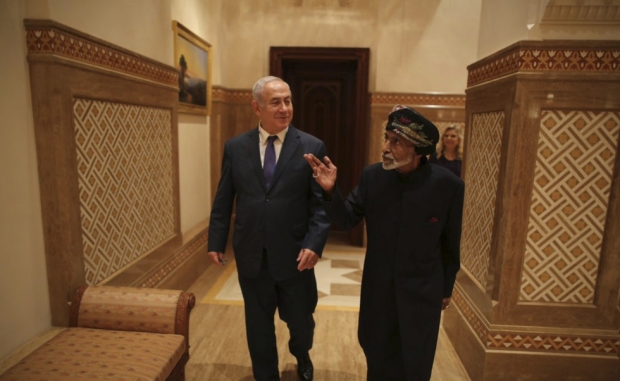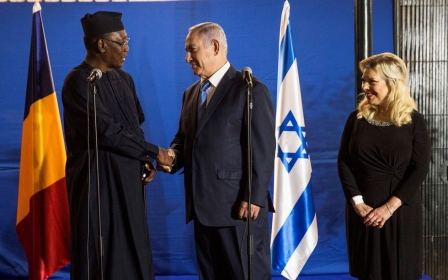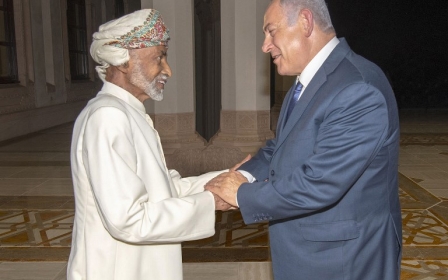Israeli minister says Bahrain invitation proof of growing Arab relations
An Israeli minister claimed on Monday he has been invited to a conference being held in Bahrain next year, lauding it as an example of Israel's strengthening relations with surrounding Arab and Muslim countries that previously publicly refused official contact.
Prime Minister Benjamin Netanyahu has for years been hinting at growing friendships between Israel and its Gulf Arab neighbours, but those relationships have recently become more open after a surprise trip to Oman last month.
Netanyahu has also been reaching out to African countries and on Sunday hosted Chad's President Idriss Deby.
However, following ministerial trips to the United Arab Emirates soon after Netanyahu's visit to Oman, it now appears Israeli Economy Minister Eli Cohen is set to visit Bahrain, a close ally of Saudi Arabia.
"I myself received a personal invitation to Bahrain," Cohen told Army Radio.
Cohen said the invitation was to a conference in the first quarter of 2019 "in the realm of technology and high-tech, in which the State of Israel is certainly a leader". He did not say whether he planned to attend.
Asked to elaborate, an Israeli official briefed on Cohen's affairs told the Reuters news agency the event to which the minister had been invited was the Startup Nations Ministerial conference on 15 April, a forum for public policymakers to discuss how to promote entrepreneurs.
The official, who requested anonymity given the sensitivity of the matter, said the invitation originated with the Manama government and was relayed to Israel by Switzerland.
Officials in Manama did not immediately respond to a Reuters request for comment. Switzerland's ambassador to Israel, Jean-Daniel Ruch, said in an emailed statement that his embassy had no knowledge of any such invitation.
Bahrain is one of several flashpoints in a regional tussle for influence between Saudi Arabia and Iran. Manama's rulers are close allies of the Saudis and Emiratis, Gulf forces that Israel has described as potential partners against its arch-foe Iran.
Planning ahead
On Sunday, Israeli Channel 10 reported that Netanyahu was planning to improve ties with Bahrain and Muslim countries in Africa. Meanwhile, on Monday, the Israel Broadcasting Corporation's Arabic-language service said Netanyahu was planning to visit Sudan and improve relations with that country.
However, on Monday, the leader of Sudan's ruling National Congress Party, Abdel Sakhi Abbas, told Turkey's Anadolu news agency that such reports were "baseless".
"[Netanyahu] cannot visit Sudan. There has been no discussion about this visit among official Sudanese circles," Abbas said.
"We discussed ... the great changes that are taking place in the Arab world in its relations with Israel," Netanyahu said. "And there will be more such visits in Arab countries very soon."
"As a leader of an African country, an important African country, a majority of whose population is Muslim, you are coming to Israel to renew our friendship and our relationship."
Wasel Abu Youssef, a senior Palestinian official, voiced displeasure over Deby's visit.
"All countries and institutions must boycott the extremist government of Israel and impose a siege on it because of its settlement activities, its occupation of Palestinian land," Youssef said.
Analysts say the Palestinian struggle for statehood has been "cast to the margins" in the recent rapprochement between Israel and Gulf countries.
"It seems as though, among the Saudis, UAE and to a certain degree Oman, they are clearly putting their stock with the official Israeli political line," Saeed Khan, a senior lecturer in Near East studies at Wayne State University in Detroit, told MEE earlier this month.
"They're either turning a blind eye or seemingly not at all interested in the Palestinian issue."
Middle East Eye propose une couverture et une analyse indépendantes et incomparables du Moyen-Orient, de l’Afrique du Nord et d’autres régions du monde. Pour en savoir plus sur la reprise de ce contenu et les frais qui s’appliquent, veuillez remplir ce formulaire [en anglais]. Pour en savoir plus sur MEE, cliquez ici [en anglais].





